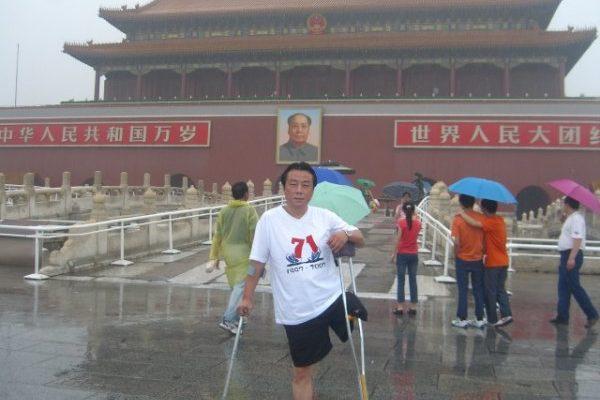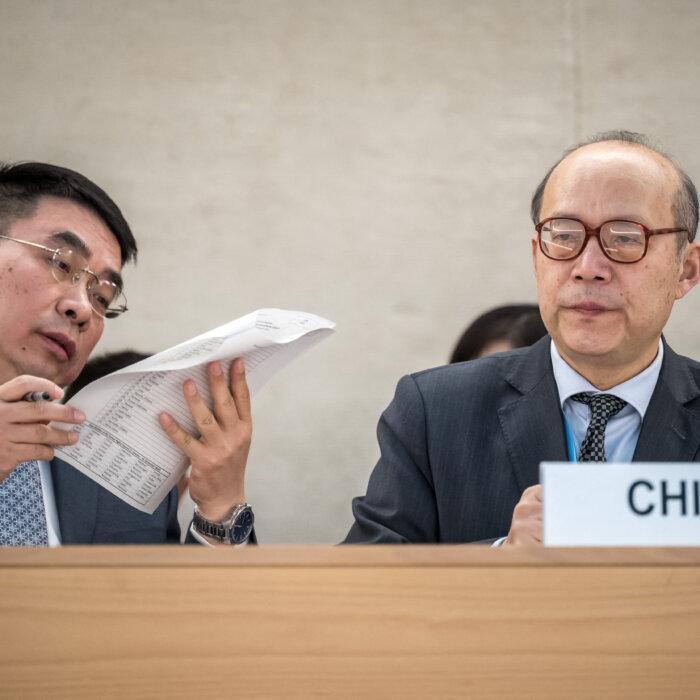Qi Zhiyong, a survivor of the 1989 Tiananmen Square Massacre, was confirmed to have passed away in Beijing on Jan. 9, according to Sun Liyong, a Chinese dissident living in Sydney.
Mr. Qi was a 33-year-old painter working for a construction company at the time of the protests. Both of his legs were amputated after he was shot by communist troops during the massacre.
The disability did not defeat him. For over 30 years, he was persistent in democratic movements inside China. He used his disability as a witness to the events of Tiananmen Square, often wearing shorts to show his scars, and openly telling his story. Offered a settlement by the state-owned construction company in exchange for his silence about his injuries, he refused.
“I will tell this story for the rest of my life,” he told Catholic news service Asia News, “because it’s not just my story. If I had accepted that offer I would have gone mad: I have a responsibility towards this nation.”
Fellow Activists Remember Qi Zhiyong: ‘A Charging Warrior’
Beijing-based human rights activist Hu Jia told Radio Free Asia that Mr. Qi was “like a charging warrior,” despite losing his legs.Mr. Qi “embodied historical evidence and was a witness to the massacre by the authorities,” Mr. Hu said. “The price he paid was second only to that paid by the students and citizens who died in Beijing.”
He said: “I was 33 years old when I was injured. Looking back on the CCP’s Tiananmen Massacre, it still makes me feel very heavy; not only does my wound hurt, but my heart hurts even more.”
He mentioned that he had never received any government assistance. As he grew older, in addition to hypertension and diabetes, he also suffered from severe kidney failure, causing him considerable distress.
Mr. Qi never gave up on his belief in democracy. Like others who publicly commemorated Tiananmen Square, he was placed under surveillance by police each year as the June 4 anniversary approached. Decades after the protests and massacre, activists like Mr. Qi are still subject to house arrest, police surveillance, forced “trips” and other restrictions in an effort to silence them.
Acknowledging Mr. Qi’s perseverance, the Independent Federation of Chinese Students and Scholars (IFCSS) honored Mr. Qi with the IFCSS 2022 Spirit of Freedom Award.
“Qi Zhiyong, rest in peace! Your kindness, your suffering, and your spirit of striving for democracy will forever endure!”
A Tireless Defender
Speaking to the Chinese edition of The Epoch Times, Mr. Sun praised Mr. Qi’s strength in fighting against the Chinese Communist Party (CCP): “For more than three decades, he had tirelessly defended the rights entitled to him, the medicine, pension, and medical treatment, against the CCP, which surely labeled him as an enemy, causing him considerable suffering.”Mr. Sun, a former Beijing police officer, was arrested in 1990, and sentenced in 1991 to a 7-year prison term on charges of “counter-revolutionary propaganda,” for the crime of launching and distributing the underground publications “Democratic China,” and “The Bell,” condemning the Tiananmen Massacre. In 2004, Mr. Sun escaped China and was granted political asylum in Australia.
After he was released from prison in 1998, Mr. Sun ran a bookstore in Beijing. He was closely monitored by authorities.
He recounted one visit with Mr. Qi: “He ran a fruit shop, and I would visit his shop every other day or two to get some fruits for my daughter, and then we would always dine at the lamb eatery by his shop for hot pot.” As they ate, they could see a plainclothes policeman keeping an eye on them from outside.
Mr. Sun recalled: “I told Qi: ‘It’s freezing cold; we’re all human beings, including the police. I used to be a cop. Let’s call him in, offer him some liquor to warm up a little.’ The policeman was quite moved at that moment.”
Mr. Sun said the last time he communicated with Mr. Qi was last May. “We chatted for quite some time. As a regular recipient of assistance from our support group, he received his first prosthetic limb from our relief fund. During that conversation, he mentioned that he was doing fine.”
In 2005, Mr. Sun started a humanitarian relief fund to assist victims of the regime’s crackdown on the student protesters, many of whom were financially ruined by their imprisonment.
In 2014, Mr. Sun told Radio Free Asia that while “it’s really useful” to protest, “Chanting slogans a thousand times for the advancement of democracy in China is not as effective as aiding a political prisoner held in a Chinese prison.”
“Humanitarianism serves as the cornerstone of any political righteousness. If humanitarian principles are absent, political discussions become irrelevant,” he said.
Mr. Sun said the CCP views every protester as an adversary and a threat to its dictatorship.
“Democracy will happen in China when the oppressed people confront the rulers and autocrats, generation after generation, until they ultimately bring down the despotic regime,” he said. He has faith that will ultimately happen: “The CCP will surely crumble and disintegrate.”






